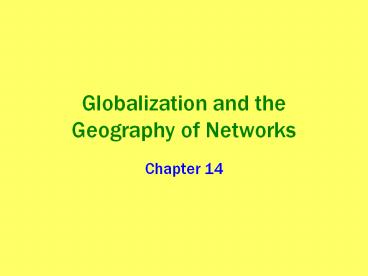Globalization and the Geography of Networks PowerPoint PPT Presentation
1 / 25
Title: Globalization and the Geography of Networks
1
Globalization and the Geography of Networks
- Chapter 14
2
What is Globalization, and What Role do Networks
Play in Globalization?
Key Question
3
What are the Goals of Globalization?
- Depends on who you ask
- World Economic Forum an annual meeting held in
Davos, Switzerland. Participants typically - - champion free trade
- - represent large corporations
4
World Social Forum
Goal of the World Social Forum Find
alternatives to the decisions being made at the
World Economic Forum. Participants are a network
of anti-globalizationists.
5
What is Globalization?
- A set of processes that are
- increasing interactions
- deepening relationships
- heightening interdependence
- without regard to
- country borders.
- A set of outcomes that are
- unevenly distributed
- varying across scales
- differently manifested
- throughout the world.
6
Globalization
Geographer Andrew Kirby explains that with
globalization, we are living not so much in a
world without boundaries, or in a world without
geography but more literally, in a world, as
opposed to a neighborhood or a region.
7
Networks
- Manuel Castells defines networks as a set of
interconnected notes without a center. - Time-Space Compression
- Global Cities
8
World Cities most Connected to New York City
This map shows the 30 world cities that are the
most connected to New York City, as measured by
flows in the service economy.
9
Castells claims that the age of information
technology is more revolutionary than either the
advent of the printing press or the Industrial
Revolution. Determine whether you agree with him,
and write an argument in support of your position
(use specific examples to support your
conclusions).
10
At What Scales do Networks Operate in the
Globalized World?
Key Question
11
Networks in Development
- Nongovernmental Organizations (NGOs) have created
a web of global development networks. - Participatory Development idea that locals
should be engaged in deciding what development
means for them and how to achieve it. - Gets back to What is development and how do we
measure it?
12
Networks in Development
Local Currencies A network of people exchanging
services and products through a currency that
holds meaning and value only to those
participating in the network. In Argentina
(right), 5,000 different local currencies and
barter clubs exist.
13
Networks in Media
- Vertical integration a corporation that has
ownership in a variety of points along the
production and consumption of a commodity chain. - eg. Media Companies
- Goal is synergy, the cross promotion of
- vertically integrated goods.
14
Networks in Media
15
Networks in Media
Gatekeepers People or corporations who control
access to information.
How does vertical integration of Media affect the
number of gatekeepers? How do weblogs affect the
number of gatekeepers?
16
Networks of Retail Corporations
- Horizontal integration ownership by the same
firm of a number of companies that exist at the
same point on a commodity chain. - eg. The Gap (Banana Republic, Old Navy)
- Global retail corporations have more connections
to the local around the world than global
manufacturing corporations. Retail stores create
a local presence.
17
Think of a place you have been where the global
media have worked to create a synergy. Describe
the presence of the global media entity in the
place and show how the global media have
imprinted the cultural landscape of the place and
how that imprint affected your experience in (and
your sense of) the place.
18
How have Identities Changed in the Globalized
World?
Key Question
19
Identities in a Globalized World
- Identity how we make sense of ourselves
- We have identities at different scales.
- Globalized networks interlink us with flows of
information and global interaction. - In a globalized world, a growing number of people
are making sense of themselves within the
context of the globe.
20
Personal Connectedness
- When a tragedy occurs somewhere in the world,
people have the desire to - personalize it.
- localize it.
- In the process of personalizing and localizing a
tragedy, a new global awareness can be created.
21
Personal Connectedness
- When a death or tragedy happens, how do people
choose a local space in which to express a
personal and/or global sorrow? - Short term spontaneous shrines
- Longer term permanent memorials
22
- By allowing individuals to share loss, tragedy,
and sorrow with others, these places can
sometimes allow people to build community and a
sense of common purpose. - Ken Foote
23
Landscapes of Violence and TragedyGeographer
Ken Foote draws from extensive fieldwork to
understand how Americans memorialize
tragedy.Arlington National Cemetery (right)
where thousands came to pay respects to
Jacqueline Kennedy Onassis, who had recently died.
24
The Process of Memorializing Place
- Whether and how quickly a place is memorialized
depends on - - funding
- - debate over
- what to build
- - who to remember
- - whether people
- want to remember the site
25
How does the personalization of tragedy, such as
September 11, the Indian Ocean tsunami, or
Hurricane Katrina promote both globalization and
localization at the same time?

